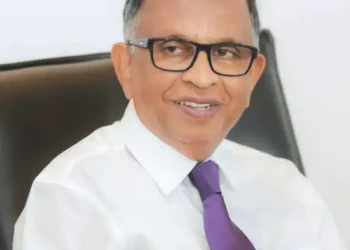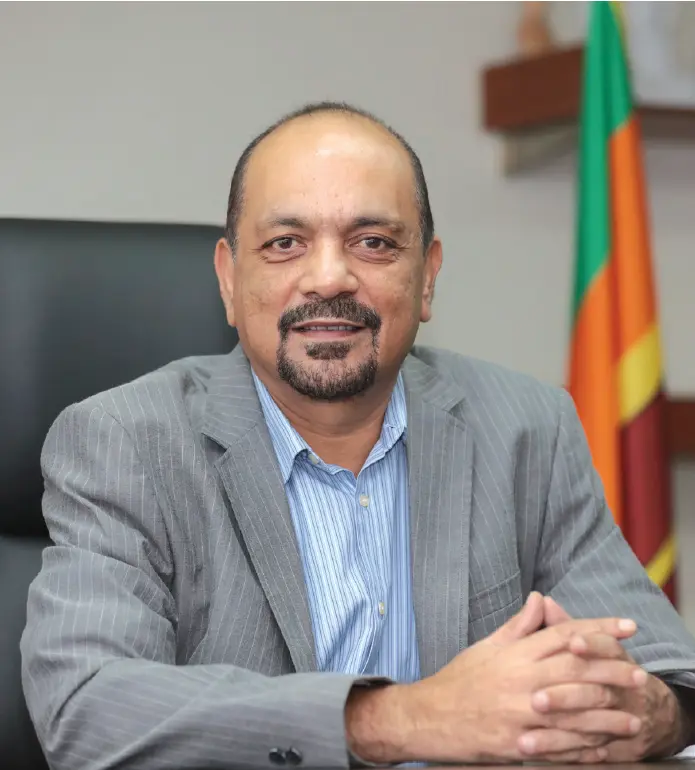
Kanchana Ratwatte, Chairman, Bank of Ceylon (BOC) has diverse experience in a multitude of sectors, which he has brought to the Bank. His long years of association in the public sector has ensured that the vision for the country is portrayed in the organizations that he heads. The Chairman speaks about the many initiatives taken by BOC to support the people of this country especially in the agriculture and fisheries sectors, small and medium scale entrepreneurs and other industries in order to ensure that the wheels of the economy continue to keep moving during these challenging times. He says that the “reset button” has been pressed, where the people and the country should identify their priorities. With the activities that were initiated in 2020, the outlook for 2021 he says will be a year of consolidation.
By Udeshi Amarasinghe. Photography Menaka Aravinda
What is the current status of the Bank? With great pride let me spell out the major achievements of the bank in her 81st year of existence. As we speak we have achieved that magic number of USD 2.5 billion in foreign remittances, which is over 40 percent market share during the year, which is a marginal increase from the previous year. We have achieved a growth in our loan book of 25 percent for the first nine months. Our deposit base has grown by 15 percent from last year to LKR 2.3 trillion. Our asset base has grown to over LKR 2.8 trillion and we are optimistic that it will reach the LKR three trillion mark by the first quarter of 2021. By far, we are the largest commercial entity with its footprint right across the country. Playing a true leadership role, we account for 23 percent of the banking sector assets and leading in loans, advances and deposits by well over the 23 percent market share.
Can you elaborate on the situation of BOC at the time that you were appointed as the Chairman? A new board was appointed to BOC in January 2020. Our tenure started in 2020 in a situation where an economy that was growing at almost five percent GDP in 2014 had dipped to 2.3 percent by 2019. Where general loan interest rates given by the banks were around 15-16 percent and there was a VAT, which was imposed at 15 percent from about the year 2016. Furthermore, when one includes the repercussions of the Easter attack, and the general mismanagement of the economy to the above, the entire business environment at the time was not very conducive for growth. About the time our board took over the first thing that was introduced by the Central Bank, was a reduction of interest rates and the Treasury intervened by introducing the reduced VAT. Both of these created a very positive business environment for any entrepreneur who was in difficulty at that time. If one takes these multiple considerations and the lack of attention given to the security of the country, because the general populace vote for a Government for the purpose of development of the country and more importantly for the maintenance of security and law and order for the general public. When these crucial elements were lacking everything else fell apart. From that environment we come to the current situation where law and order is high priority and where lending rates have become single digit within a period of a few months of the Government coming into power and across the board a low income tax regime has been introduced and VAT has also been reduced to eight percent. This created a very conducive environment to move forward with the economy. There was also the NBT and the Debt Repayment Levy that had been imposed on Financial Institutions too at the time, which was also removed by the current Government. Unfortunately, from March 20, 2020 there was a lockdown due to the pandemic that has affected the entire world. A significant remedy was the moratorium that was introduced by the Central Bank in the month of March until September 2020. As per the features of that moratorium, we were in a position to assist about 220,000 customers where almost all sectors of the economy gained tremendously. If you look at what was affected by the moratorium, it was not the mere pushing back of the repayments that were due, but also the accumulation of working capital in the hands of entrepreneurs was what was expected by the Central Bank, which was very effective. The impact on the Bank by providing a moratorium was an immediate negative impact on our balance sheet to the tune of LKR six billion but under the circumstances, we were very happy that we were able to assist the 220,000 enterprises and entrepreneurs so that they could revitalize themselves and emerge from the situation that they were in. That was the most important activity that took place prior to the COVID-19 situation and coming to post March 20, 2020 the situation in the entire country was like the rest of the world. We are still unable to do our normal activities. We are currently experiencing a situation where someone above has decided to press the “reset button” where we get our priorities right and start from our basics. That is what the Bank has focused on and food security is our main concern during that next phase.
How is BOC supporting the people during the ‘new normal’?
Now we are getting into the micro picture of the focus of the Bank. We initially embarked on introducing a new scheme by the Bank itself for the SME sector for any local production or any value addition with a focus on basic needs. Food was our focus and we vigorously went into the agriculture sector, animal husbandry and fisheries. We also considered livelihoods as an important focus area and made a significant emphasis on the SME sector. Rice as the staple food got its space and the next one was maize. Maize has a major impact on the food industry because that is the most important ingredient in animal feed. In the beginning of this year, the Government took a conscious decision to impose a ban on the importation of maize in order to help the local farmer rather than the overseas based farmer, which had an immediate impact and the local farmer received a better price and local production was enhanced. The unfolding situation with the general lockdown in the country was well managed as there were sufficient stocks of paddy and maize, with the Bank coming into play by providing what is called a “pledge loan” for purchasing and storage of grain. The pledge facility was utilized and the maize that was stored at the time was put into good use and the animal husbandry industry in turn, gained from the situation. There were new opportunities also that were created during this period. Take for instance the much spoken about turmeric. In 2019, Sri Lanka imported 6,000 metric tons of turmeric. 7,000 metric tons is the entire consumption of turmeric in the country. With the ban coming into place during the Maha season in January 2021, or even starting from December 2020 one will find a local production of 3,500 metric tons of turmeric, which will come into the market. Yes, the prices were high and people were clamoring to obtain the spice but it will get sorted out in the short term. In a period of six months to one year there has been no serious crisis in the country due to the lack of turmeric. It is just one ingredient in our daily meal and we have managed within our resources.
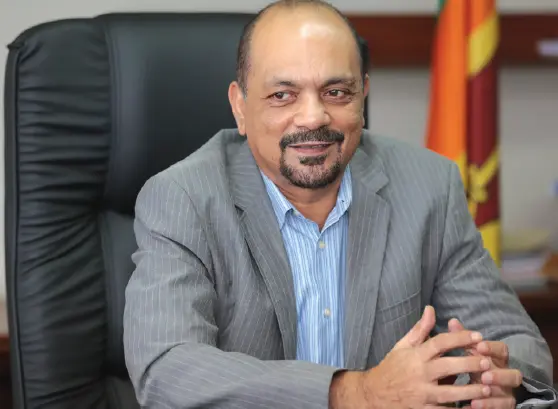
Now permit me to come to the other three loan schemes that were introduced by the Central Bank. The Central Bank came up with a very innovative and forward-thinking policy of initially introducing a loan scheme under the name “Saubagya” in March 2020. Under this scheme, the Central Bank had offered facilities up to LKR 25 million to certain segments of the economy where all banks were supposed to disburse funds at an interest rate of four percent, which was never before heard of in this country. From a regime of 16 percent high interest rates in 2019, here the Central Bank comes in with a basket of a four percent loan scheme. Of course the first phase was very restricted, where working capital was only considered as rent, wages, and utilities. There was no other component in the first phase. But subsequent phases covered working capital for supplier payments and also the third phase of this program entailed even raw material purchases through a credit guarantee scheme of the Central Bank up to a certain limit.
Therefore, Bank of Ceylon, the giant in the industry, the leading bank in Sri Lanka where we pride ourselves by saying we are number one, kept giant strides during this pandemic and managed to disburse up to 38 billion rupees, to date. We have further pledges approved by the Central Bank up to 42 billion rupees. The entire component of this “Saubagya” loan scheme is 150 billion rupees. We are proud to say that BOC has taken the brunt of it and we have taken the lead. We have taken the initiative to keep the wheels of the economy moving during a very difficult phase of this country. Over 18,000 loyal BOC customers have benefitted from this scheme and the intended objective of the Government of Sri Lanka, of improving the money circulation in the Country was achieved.
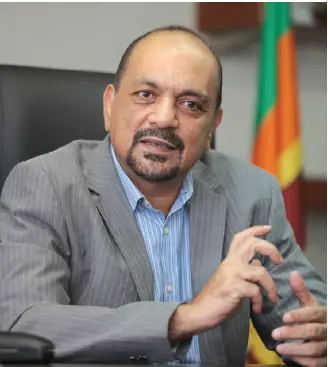
What about the Divi Udana loan scheme?
We introduced a loan scheme by the name of “Divi Udana”, which had a basket of 24 types of loans, which initially ranged from 9.5 percent, which has now been reduced to 8.5 percent to the lower-end of six percent or even four percent re-finance schemes. The lesser interest rates are focused on deserving segments of entrepreneurs, which include women entrepreneurs, small borrowers or those from difficult areas and even special rates for environmentally friendly projects. Even 8.5 percent is a significant reduction in interest rates from 2019, which was about 15-16 percent. This 8.5 percent loan scheme we initially introduced in Matara during the height of the pandemic where we offered this loan scheme to the fisheries sector. Ideally what we are trying to do through this facility is a phased out operation of upgrading the fisheries industry from whatever activity they have been engaged in. If you take the small boat owner, we encourage them to go for bigger boats. In the case of the big boat owners we encourage them to purchase trawlers.
We are proud of the fact that as the leading bank in the country we have been able to provide facilities to over 39,000 customers within a space of less than five months and almost LKR ten billion has been disbursed under the “Divi Udana” loan scheme. We also had engagements in other districts to promote these schemes amongst the SME entrepreneurs in all sectors.
BOC has been focusing on the agriculture sector as well. Can you elaborate on the support provided?
In the agriculture sector, we have a longstanding loan scheme for the small farmers, up to 32,000 rupees per acre cultivated, at four percent interest. This is a refinancing scheme introduced by the Central Bank and we are trying to push this forward to ensure food security. Then comes the second phase, which is storage. We are encouraging people to engage in storage activities and to ensure that there would not be a food scarcity amidst this pandemic. We do not yet know when the end of the tunnel would be. We are very optimistic within the next six months that we will be self-sufficient in all the sectors that are required for consumption of the local community. In the implementation of this small farmer scheme, our loan scheme caused a few problems for the managers. In the document that had been circulated to the branches, there were a few clauses, such as the ownership of the land had to be shown, and the provision of two guarantors from within the farming community who should be government servants as well, and the third issue was whether a person was in the CRIB. With these issues there were limitations in moving forward with the loan schemes. Immediately the management of the Bank intervened and the provision of a certification that showed that they had been cultivating the land was sufficient to fulfil the requirements of the Bank. With regards to getting two Government servants to guarantee it may not be humanly possible to get the 1.5 million public sector employees to sign up for farmers and that requirement was withdrawn and the entire loan scheme became easily accessible to the ordinary farmer. As of now we have reached out to farmers throughout the country where the focus is agriculture.Every year with the advent of the Maha season, the Government faces a problem with the storage of paddy. It is not only with the storage of paddy but it is a general problem with the storage of all types of agricultural produce in this country. We have market complexes in Dambulla, Nuwara Eliya and a few other places but we do not have large scale storage facilities or freezer facilities available in these areas to do large scale storage. If one looks at the cereals, yet again storage for the whole year is an issue, because the Maha season is the main season for rice and other cereal in the country. During the Yala season only one third of the crop is produced. For the Maha season when there is a bumper crop we encounter this issue with regards to storage. With adequate rains throughout the country as we experienced this year a good harvest is anticipated between January 2021 and April/May 2021. We have to be prudent in our thinking and ensure that storage facilities are enhanced and the entire “Maha” stock can be purchased and stored. We have an interesting loan scheme known as the pledge loan scheme. A person who owns storage can show the storage and handover a key to the Bank, provide 25 percent of the funding and the Bank will provide up to 75 percent in order to purchase the grain item for storage. This scheme is provided for paddy, maize and in 2020 when there was an issue with pepper, we introduced the loan scheme to the pepper sector as well. Therefore, we provide this loan scheme to any agriculture sector that is deemed suitable for the facility by the Bank. BOC will be funding 15-20 billion rupees worth of food storage during the Maha season. What we are looking at, is enhancing the capacity to store over a longer period in order to ensure that the farm gate price increases and the farmer gets his due and is encouraged to engage in agriculture, which was not a focus in the past but is definitely a focus of the current Government. We also have another focus area in dairy and poultry. We have conducted seminars and workshops focusing these areas as well with a view to promoting women entrepreneurs and small ticket loans at low interest rates. Despite the pandemic and the travel restrictions that followed, the entire senior management of the Bank has been vigorously promoting these loan schemes in all parts of the country.
We follow a two pronged approach and while visiting the provinces, we address the beneficiary farmer communities and also the Bank staff in order to facilitate easier access to farmers.
The tea industry will be receiving support from BOC as well. What is the thinking behind this?
We had a seminar in Ratnapura for the SME sector in the tea trade recently. The issues that they were facing were in relation to capital requirements. Some were BOC customers while others were not. One huge factor that they were facing was regarding the advances that they had taken from the brokering firms, which were ranging at 18-19 percent and in some instances they had borrowed at higher rates too. We are still in negotiations and finalizing stages, but the Tea Board and BOC will introduce pledge schemes for the tea industry to ensure that they would get credit facilities as much as the other industries and entrepreneurs. Tea is one of the more mature industries. If I were to quote a statement made by Dr P B Jayasundera in 2012, he said the British have left a 150-year industry and a legacy for the country to survive in the tea industry. By that time an amount of USD two billion had been introduced to the ports sector and he was looking at a future where the entire Sri Lankan economy could be managed with that investment because ports was the focus area during that period. Unfortunately, intervening circumstances did not take us to the required target but that was the goal and the dream of the Government at the time. The tea industry has a legacy and a mature industry where Sri Lanka has a respected brand name. If one looks at the population that is dependent on it, there is a direct employment of 500,000 families living on the plantations and living off the trade. Then the add-ons from the transport sector, warehousing, the shipping and the services that are provided the entire dependence on the tea trade is more than a million people of the population of Sri Lanka. Multiply the million people into families, you will find almost three million people living off this industry. Thus, the industry needs a big helping hand. If you look at the net income, it is much higher than most of the other industries that we indulge in. We need to reap the maximum benefits from this industry until the other foreign exchange earning industries like the hotel trade, and the airline industry just to name a couple, are back on their feet post COVID-19.
Why should a customer come to BOC?
There is a misconception in relation to State Banks, that large entities feel comfortable with foreign banks or even private sector banks. But with regard to the capacity, the hunger and thirst to lend, BOC is way above the others. Procedurally this misnomer, which has to be rectified is that this Bank also adopts the same process that any other bank would adopt, and would have to assess the credit worthiness of a customer before any facility is granted. In actual fact does a customer feel, it is easier doing business with a private sector bank as against a state bank? It is not so. We have seen a major increase in the loan book of the Bank in the current year, which has seen a 25 percent growth compared to last year up to the third quarter. Then also consider the efficient implementation of the moratorium among 220,000 customers and the implementation of the “Saubagya” four percent loan scheme of the Central Bank. BOC was well ahead of the competition and right on top. That is why BOC should be the preferred Bank. It is only in a serious crisis that the helping hand and the rescue effort is required. It is not only when the going is good. The strength of the State Bank is always a comfort! We stood tall during the crisis!
What are your comments on the rating of the Bank?
It is conceded, that our rating has been downgraded adopting the criteria laid down by rating agencies. However, the impact that the COVID-19 situation had on the banking industry was mitigated due to the expansion of our loan book. We have multiple factors that affect the rating of the Bank. One major concern is each time there is a downgrading of the country’s rating, the rating of the Bank also suffers due to the fact that it is a State bank and our rating is dependent on the sovereign rating. Furthermore, in any given situation it is the giant of this country, BOC that comes to the rescue of the Government, in order to enhance any credit facilities that are required by the State or for the promotion of State sponsored schemes for a larger segment of the community or for equitable access to credit.
That also increases the risk factor considered by the rating agencies. BOC’s exposure to the Government, to sovereign bonds, to SOEs, and to the Treasury too has an impact on our rating. With the COVID-19 situation too, the Bank’s rating suffered. Due to the rating coming down, we have to invariably make provisions in our balance sheet, which hampers the profitability. That is not the current concern of the administration nor of the Government. Ours is a concern to ensure we take the lead in ensuring the wheels of commerce continue to move in the short term until this difficult phase is over. Despite all these issues faced, we have still made a healthy third quarter unaudited profit of LKR 16.5 billion, which is the highest amongst the peers in the industry. It is probably due to this factor that multi-lateral and bi-lateral lenders still consider BOC as a partner to whom they could lend US dollars solely on our healthy balance sheet.
What about the large corporate customers?
If one looks at the larger corporates in Colombo, the majority of them bank with BOC. Are their main accounts with BOC? Yes, their main accounts are with BOC. The large corporates who have come to us have had the best possible rates they could get from the market, and also had the advantage of varying those rates when the prevailing rates changed in the market. Whatever impact that is made by the decisions of the Central Bank with regard to the interest rates coming down is passed on to the customer in the first instance itself, because our balance sheet is strong and is able to pass it on immediately. One area that the Bank could possibly expand vigorously would be in investment banking with equity participation to expand the value addition of locally available minerals such as phosphate, ilmenite, graphite and many more.
Consolidation of the banking sector. Your thoughts?
There was a recommendation in the Budget on the consolidation of the banking sector. Whatever decisions that have to be taken, let us admit that this is not the conducive environment for new investments to come into the country.
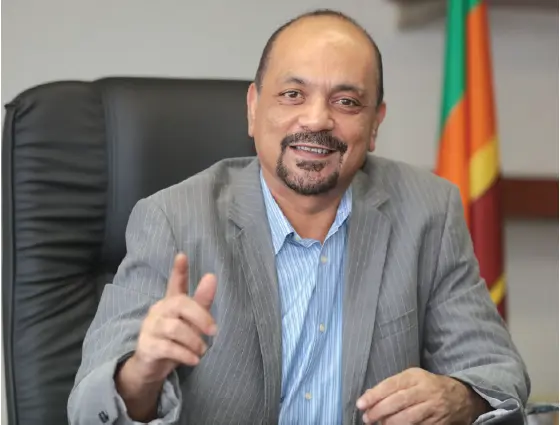
It is not a conducive time to even consider, because a true and proper price may not be elicited in this environment. Therefore, we have to wait for things to settle down to consolidate every industry. In the short-term we should focus to ensure that the rest of the country and the economy keeps moving in order to ensure there is no lack of resources in financing for anyone to sustain during this difficult period.
Tourism, what is next?
Considering the tourism industry we have to ensure that the hotels are “room ready” for the arrival of the first tourists from the moment the flights come in. If one looks at the influx that is going to come due to the prolonged frustration of people not being able to travel, there is going to be an influx of tourists the
moment the markets open. For that we have to be “room ready”; that is to be ready with our transportation and ready with our entertainment and we have to be ready in order to accept the tourists. For which, the Bank should permit the moratorium and allow the sector to survive during this period. As much as I say that, all other industries too are not at their normal pace. Whether it is a garment industrialist or jewelry industry the add-ons in life have been sacrificed by many people as of now. The “reset” button has also helped us realize our priorities. What are the necessities? We should not go beyond our needs to sustain during this period. It augurs well for us to think of, as Asians and Sri Lankans, where our ancestors lived with the basic requirements in life. It is not a case of going back. The unwanted flashes, add-ons can be sacrificed until we return to normalcy.
There has been a change in the manner in which BOC operates since your appointment. What can you tell us about the staff at BOC?
Has there been a change in the BOC? Yes, certainly; with the advent of a new Government the vision and the mission of the Government is implemented in a state owned enterprise. It is in that regard that there is a change at BOC. If you look at the giant that BOC is, it does not require any marketing because our brand image is such there is no marketing that we need to do! Our brand is well-known, there is no reach-out program required by the Bank! But nevertheless if you look at this entire COVID-19 period, the Bank has been reaching out! Conventionally the attitude of the Bank staying in one place and the customer reaching out to the Bank has changed and our staff went out and marketed the loan schemes and that is how we managed to reach the number one rank in CBSL introduced loan schemes. The COVID-19 situation has resulted in the mind-set being changed in the employee as well where they have understood that they need to reach out to ensure that the entrepreneur survives and the entrepreneur is brought to his/her feet rather than be in difficulty. It is a two-way thing; the Bank going out and reaching out to the customer and ensuring the customer makes better profits, ensuring that he services his loans properly will in turn ensure that the Bank makes profits. That is the concept we work on rather than stay stationary for the customer to walk in. In engaging with the staff, when we go outstation, we make an extra effort to engage with the staff informally and the cultural barrier is broken. We get the senior management and the middle management, to a location in the region, and a day spent is very well spent because the senior management is made aware of whatever issues that may arise locally or individually in order to ensure that a content workforce is maintained at the Bank. Whether in Kurunegala, whether in Kantalai, whether in Pottuvil, whether in Chilaw or whether in the deep South the interactions with the staff of the Bank by the senior management has had an impact on the attitude and has resulted in better results. If you look at the entire 8,000 plus staff, it is a very positive factor considering their experience and exposure. If you take the senior management, the staff member hailing closest to Colombo would be from Kalutara.
If you take the General Manager, he is from Hanguranketha. When you look at the Deputy General Managers they are from varied places and certainly not Colombo centric. If you look at their school backgrounds they are from public sector schools. All of them have risen through the banking system and are deeply rooted to the soil, which is the most important factor, because culturally there is a bonding towards the institution and the nation, which reflects or resonates in their engagement and involvement in their work. BOC is associated with Buddhist, Christian, Hindu and Islam events due to the diverse backgrounds of the members of the staff. There is adequate space for festivals of all religions such as Vesak, Christmas, Deepavali, and Ramazan amongst others which are part and parcel of the festivals celebrated by the Bank, which gives that cultural, religious and ethnic balance. Carol service was celebrated last year despite the COVID-19 situation in a restricted environment.
Can you elaborate on the manner in which the vision of the President and Prime Minister is taken forward?
We are on a path of strengthening the local entrepreneur. If you look at the new culture that has been introduced; from a series of photographs that would have been hanging on the wall at BOC, today you would see the national emblem and that is all that you see in this office. When you go to the Katunayake airport you do not see the smiling face of the leader. A leader need not be seen but has to be heard and the vision has to spread throughout the country. Ensuring that the goals of the Government are met is the single message that needs to be conveyed and that is the single message that we work on. The vision of the present Government, HE the President and the Prime Minister is to ensure the enhancement of the local industry. If one looks at the economy whether it is post COVID-19 or otherwise, because it was before COVID-19 came that there was a great focus on introduction of technology, introduction of local entrepreneurship, and introduction of Sri Lankan brand names. This is the focus that we are working on, and is also the focus of the Government where our resources, time and energy are required.On this topic let me add that one pleasant engagement that we have is the opportunity to travel right around the country and meet people with diverse interests. This was despite the pandemic and we have traveled to most parts of the country with the senior management and met the local entrepreneurs of those areas to seek or reach out to them with their financial requirements. Particularly we ought to understand that the entrepreneurs are coming out of a difficult situation where the entire focus was not business savvy, with high interest rates and high taxes, such as VAT, NBT and With-holding Tax. We came out of a high tax and high interest regime. Under the previous administration as I said earlier by the time a person starts a business he encountered 15-16 percent bank interest rates, VAT at 15 percent and also NBT and WHT. With all the taxes and interest rates about 32-33 percent has already been spent. With those high interest rates and high taxation people were in great difficulty. We are now reaching out to them and to get them back on their feet in order to ensure that these customers are looked after. This is the mission of the current Government and its leadership.
You have diverse experience. What are the experiences that you bring to BOC?
I must admit that I came as an amateur to the Banking industry. However, I brought along with me experience in the telecommunications industry as the Director General of Telecommunications, I have experience in the shipping industry as the Chairman of the Ceylon Shipping Corporation, I have experience in standards as the Chairman of the Sri Lanka Standards Institution, I have experience in IT having been involved in the IT sector for over 20 years. I have my legal background. I have brought all these diverse experiences to BOC. Banking is a new area, but one year down the line I cannot say it is a new area anymore. We should be converse enough to handle the situations that arise on a day to day basis from the micro customer to the major corporate who would seek the assistance of the Chairman in the event they are unable to acquire whatever requirement they come to the Bank for.
Futhermore, in your legal career you have secured a landmark victory for the public sector. The client was very emotional and appreciated your service. It is rarely that you see such reaction from a client to a lawyer. Your thoughts?
2014-2019 was a difficult time with many cases of that nature and this was one case that came into the spotlight. The particular client had to visit the ‘Gestapo’, as I would call it, which were the FCID, CID and the Bribery Commission on almost 40 different investigations on multiple occasions. There were so many issues that he had to face. It is because of those circumstances that he may have become emotional. Five years of litigation may have been quite a harrowing experience. Even otherwise it is a victory for the public servant. The practical usage of the Establishments Code, Procurement Guidelines and the Financial Regulations of the Government of Sri Lanka all came into focus and it came out in the judgment that the process adopted did not have any criminal misappropriation within the meaning of “criminal misappropriation” of the Penal Code. A public officer can engage in his profession without having any apprehensions of the long arm of the law coming after him/her on an act not done with any criminal intent. That is the fundamental principle, that there was no criminal intent and there was no misappropriation in the act of distribution that was performed by them.
What are your other interests during free time?
Travel to historical destinations, reading history, cycling and leisure tennis.
You maintain a low profile. Why is that?
The Bank is the big institution. It is by far the number one brand and the number one commercial establishment is Sri Lanka. It’s an institution with an 81 year existence and vibrant. I remain a temporary occupant of the seat. It’s the profile of the Bank that is important and that remains number one as one of the most sought after brands in the country.
Outlook for 2021?
2021 will be a year of consolidation. I would not call it a year of challenge because if we could weather the storm of 2020, then 2021 is a year in which we are going to reap results and that is going to be the year of consolidation for BOC and the entire country.



